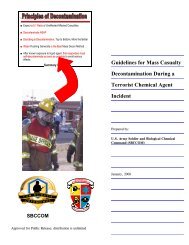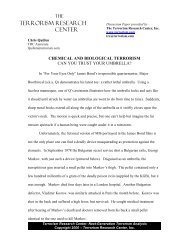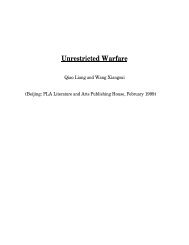Combating Proliferation of Weapons of Mass Destruction
Combating Proliferation of Weapons of Mass Destruction
Combating Proliferation of Weapons of Mass Destruction
You also want an ePaper? Increase the reach of your titles
YUMPU automatically turns print PDFs into web optimized ePapers that Google loves.
The Coordinator <strong>of</strong> U.S. Assistance to the New Independent States <strong>of</strong> theFormer Soviet Union.Within the Department <strong>of</strong> State structure is the Coordinator <strong>of</strong> U.S. Assistance to the NewIndependent States (NIS) <strong>of</strong> the former Soviet Union. This position has been establishedin accordance with Section 102 <strong>of</strong> the FREEDOM Support Act. The mandate <strong>of</strong> theCoordinator is to “assure maximum coordination <strong>of</strong> efforts within the executive branch” topromote reform and policies in the NIS. The Coordinator presides over the allocation <strong>of</strong>U.S. assistance resources, directs and coordinates the interagency process ondevelopment, funding and implementation <strong>of</strong> all bilateral assistance, trade, and investmentprograms related to the NIS. These programs include: trade and investment, business andeconomic development, training and exchange, criminal justice, energy andenvironmental, social sector and humanitarian, and security. The Coordinator is thechairman <strong>of</strong> the interagency NIS Assistance Coordination Group and is also a member <strong>of</strong>the Policy Steering Group for the NIS to ensure that U.S. assistance and related activitiesare consistent with and support broader foreign policy objectives. The Coordinator ismandated to work with U.S. Ambassadors to the NIS to strengthen coordinationmechanisms in the field and increase the effectiveness <strong>of</strong> our assistance and export andinvestment programs on the ground. The Coordinator reports to the Secretary <strong>of</strong> State.The Role <strong>of</strong> the Department <strong>of</strong> State in International <strong>Proliferation</strong>-relatedEffortsThe Department <strong>of</strong> State is the lead for the conduct <strong>of</strong> diplomacy and representation <strong>of</strong> theU.S. overseas, and the advocate <strong>of</strong> U.S. policies for foreign governments and internationalinstitutions. As such, State interacts extensively with foreign governments and multilateralorganizations on non-proliferation issues. These efforts include, but are not limited to,leading U.S. delegations in numerous multilateral bodies and negotiations, includinginternational proliferation-related treaty negotiations, export control regimes such as theAustralia Group and the Nuclear Supplier Group, and in many G-8 and NATO proliferationrelateddiscussions.The Department holds regular bilateral proliferation-related talks, in Washington and incapitals, with the United Kingdom, Israel, Australia and the European Union, during whichthe full range <strong>of</strong> proliferation-related concerns are discussed and joint courses <strong>of</strong> action areidentified. State <strong>of</strong>ten writes instructions to U.S embassies to deliver messages to hostgovernments that may address such issues as halting an export to a country <strong>of</strong> concern,or seeking coordination <strong>of</strong> public reaction to the South Asian nuclear tests. In the UnitedNations Security Council, State coordinates efforts to consult both in New York and incapitals on issues <strong>of</strong> proliferation concern.28







